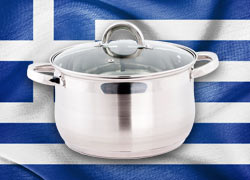There are two definitions for a Dutch Oven and both are equally fitting for the stunt the Dutch finance minister pulled during the final delicate negotiations over the details of the Greek bailout;
[ordered_list style=”decimal”]
- A Dutch Oven is a thick-walled (usually cast iron) cooking pot with a tight-fitting lid. Dutch ovens have been used as cooking vessels for hundreds of years. They are called “casserole dishes” in English speaking countries other than the USA, and cocottes in French.
- A Dutch Oven is is a slang term for pulling a cover over someone’s head while in bed and creating flatulence, thereby creating an area of foul odour air in an enclosed space that must be inhaled. This is done as a prank, or by accident to one’s sleeping partner.
[/ordered_list]
The Dutch finance minister has revealed that he wants a “permanent Troika presence” in Athens, in return for the second finance package. Jan Kees de Jäger made the comments, which temporarily threw the Greek crisis into fresh uncertainty, before the talks began in Brussels on Monday afternoon. He insisted that the European Union, the European Central Bank and the International Monetary Fund have a fixed role within the Greek capital in the years ahead.
Euro zone finance ministers inched towards approving the second bailout for debt-laden Greece on Monday helping resolve Athens’ immediate repayment needs but would not revive the nation’s shattered economy. Agreement on the 130-billion-euro rescue package on strict conditions would finally bring to an end months of uncertainty that has shaken the currency bloc, and avert Greece’s bankruptcy.
Officials are struggling to make the numbers crunch. EU sources said they had to find a further 6 billion euros to make the financing work, private investors might have to take bigger losses. After seven hours of talks, senior officials said ministers had found ways to cut Greece’s debt to between 123 and 124 percent of gross domestic product by 2020, but were pressing for more. Negotiators for private bondholders had offered to accept a bigger loss to help plug the funding gap. The often referred to haircut may now need to exceed 70%.
A report prepared for ministers by EU, European Central Bank and IMF experts, states that Greece would need extra relief to cut its debts to the official target of 120 percent of GDP by 2020.
There’s some glaring issues in the troika’s report into Greece;
[unordered_list style=”red-x”]
- Greece may not be able to deliver reforms at the pace required under the baseline scenario
- The recapitalisation of Greece’s banks may need to be raised to €50bn. The previous estimate was €40bn.
- The troika report found that the baseline scenario is that Greece’s debt-to-GDP ratio will only fall to 129% by 2020, not 120%.
- Should Greece’s recession deepen, and structural reforms not be implemented, the ratio could still be at 160% in eight year’s time.
[/unordered_list]
The troika suggests ways that the European Central Bank, and others, could bring Greek debt down to the 120% target. They are:
[unordered_list style=”tick”]
- Restructuring accrued interest on Greek bonds, cutting the ratio by 1.5 percentage points.
- A lower interest rate on existing bilateral loans. Cutting another 1.5 percentage points of the debt/GDP ratio.
- Restructuring the Greek bond portfolios of the various eurozone central banks. That could cut the debt/GDP ratio by 3.5 percentage points.
- The ECB could give up “profits” on its Greek bonds. That could save 5.5 percentage points.
[/unordered_list]
Market Overview
Stocks rose for a fourth day and metals rallied after China’s central bank cut reserve requirements for lenders. Euro and Italian bonds gained as European leaders prepared to discuss a Greek rescue.
Standard & Poor’s 500 Index futures added 0.5 percent. U.S. markets were closed for a holiday on Monday and the yield on the 10-year Italian note fell 10 basis points. Copper broke a six-day losing streak in London. Oil climbed to a nine-month high as Iran said it halted some crude exports.
The yield on the Greek bond due October 2022 declined 54 basis points to 33.84 percent. The Spanish 10-year yield slipped 10 basis points, while the German 10-year bund yield rose four basis points.
Commodity Basics
Copper added 0.7 percent in London. Oil in New York jumped as much 2.1 percent to $105.44 a barrel, the highest price for a most-active contract since May 5. Iran will supply crude to “new customers” instead of companies in the U.K. and France, according to the oil ministry’s news website, Shana, citing Alireza Nikzad Rahbar, a spokesman.
Forex Spot-Lite
The euro climbed 0.9 percent versus the yen. The Dollar Index, which tracks the U.S. currency against those of six trading partners, declined 0.4 percent. The euro appreciated 0.8 percent to $1.3243.





